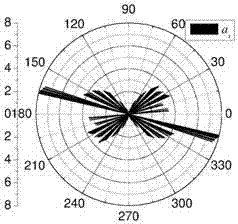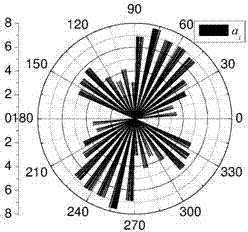Microfabric quantitative test and analysis method for orthogonal anisotropy of granular material
An orthotropic, granular material technology, applied in the direction of analyzing materials, instruments, etc., can solve problems such as inability to describe orthotropic
- Summary
- Abstract
- Description
- Claims
- Application Information
AI Technical Summary
Problems solved by technology
Method used
Image
Examples
Embodiment 1
[0046]1. Solidification of orthotropic fabric of granular materials:
[0047] use figure 1 The sample preparation method shown produces sand samples of various orthotropic fabrics. figure 1 It is the sample preparation method of remolded sand. The sand sample mold is fixed by the mold frame 1, and the mold frame can be adjusted to different angles, and the sand falls into the mold from the sand spreader 2, and the layered sample is prepared (the excess moisture of the wet stamping method can be discharged through the conduit 3); After the sand sample reaches the sample preparation height, remove the excess sand sample, and keep the sand 4 on the top of the mold first; install the mold side plate 5, fix and turn over the mold frame 1, remove the excess sand 6, and the sand sample is completed.
[0048] In order to completely solidify the sand sample and reduce the influence of the sand-soil structure, the mold was gently placed in the sand sample solidification chamber, and t...
PUM
 Login to View More
Login to View More Abstract
Description
Claims
Application Information
 Login to View More
Login to View More - R&D
- Intellectual Property
- Life Sciences
- Materials
- Tech Scout
- Unparalleled Data Quality
- Higher Quality Content
- 60% Fewer Hallucinations
Browse by: Latest US Patents, China's latest patents, Technical Efficacy Thesaurus, Application Domain, Technology Topic, Popular Technical Reports.
© 2025 PatSnap. All rights reserved.Legal|Privacy policy|Modern Slavery Act Transparency Statement|Sitemap|About US| Contact US: help@patsnap.com



